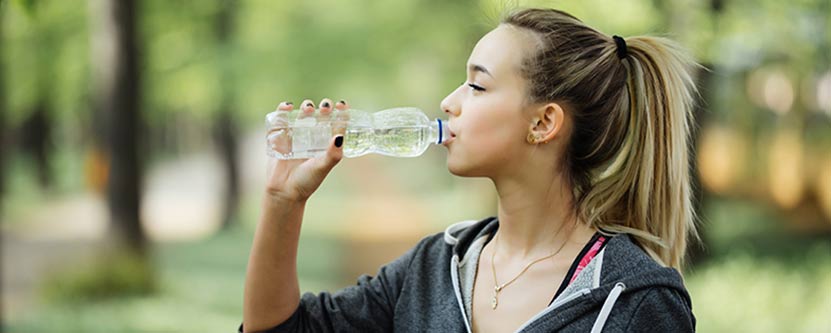Being well-hydrated is essential for good health. Consuming water is necessary to keep the body’s systems functioning properly.
[the_ad id=”6157″]
This is especially important to remember during the summer months when we need to increase our fluid intake to counteract warmer temperatures and higher humidity.Whether you’re at work, exercising, playing sports, traveling or just lounging in the sun, it’s especially important to take precautions to stay hydrated during the hot summer months. Many tend to forget that during exercise we experience increased sweat loss (compared to day-to-day activities like working at a desk or watching TV).
- Drink plenty of water (at least 8 glasses) to prevent thirst.
- Always carry a water bottle, and if you have desk job, always keep one at your desk.
- Drink water during your meals. Not only can it help you stay hydrated, but it can help you feel more full, which can help prevent you from overindulging at mealtime.
- Coconut water is delicious and filled with electrolytes, so it makes an excellent alternative to water on hot days.
- Drink diluted fruit juices. If drinking water is too bland for you, you can enjoy diluted fruit juices. Choose natural, 100% juice options with no added sugar, such as apple juice or cranberry juice, then just add water.
- Add a slice of fruit to your water. Spice up your glass of water by adding a bit of fruit. Slices of lemon or lime, add mint are classic choices and can make your glass of water more refreshing. You can also think outside the box with slices of cucumber, orange or grapefruit. A simple slice of fruit can improve the taste of your water, and may even add a bit of Vitamin C to your drink.
- Eat fruits and veggies. Fruits and veggies are filled with water, and eating plenty of them helps you stay effectively hydrated. Prepare for a big day out in the sun by eating plenty of produce before and eat a nice big salad with strawberries and tomatoes, or snack on watermelon, celery, and grapes. Most fruits are a great source of electrolytes and fluids.
- Sip on a mug of herbal or green tea. If you make this a habit, you’ll add an extra cup of fluid to your routine every day.
- You can also replace fluid and sodium losses with watery foods that contain salt and potassium, such as soup and vegetable juices.
- For long hikes, when you’ll need food, dried fruit and nut mixtures contain high amounts of potassium, sodium, protein, carbs and calories — though continue to drink plenty of water.
- Avoid alcohol the day before or the day of a long exercise bout, and avoid exercising with a hangover.
- Begin exercise well-hydrated. Drink plenty of fluids the day before and within the hour before, during and after your exercise session.
- Following strenuous exercise, you need more protein to build muscle, carbohydrates to refuel muscle, electrolytes to replenish what’s lost in sweat, and fluids to help rehydrate the body.

